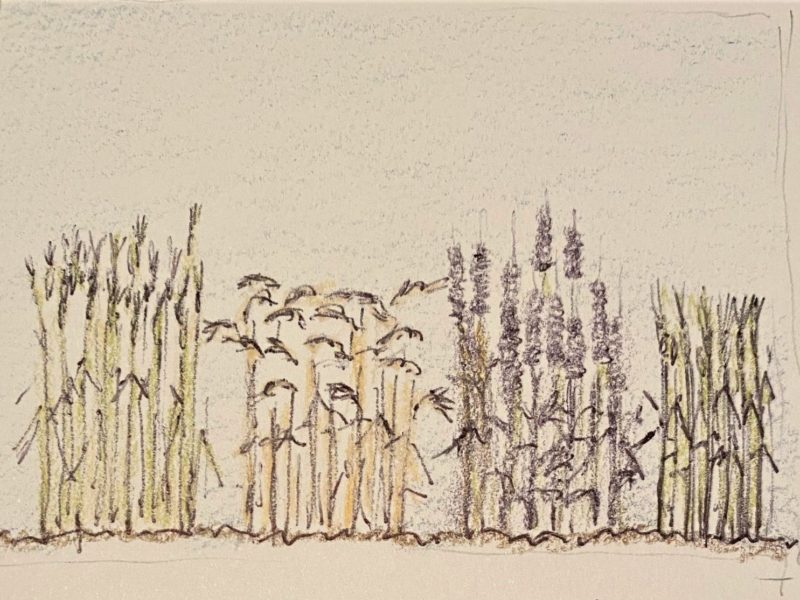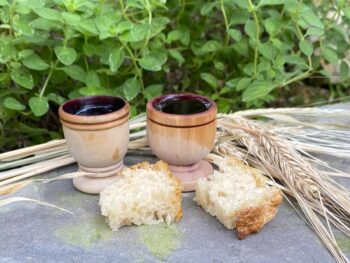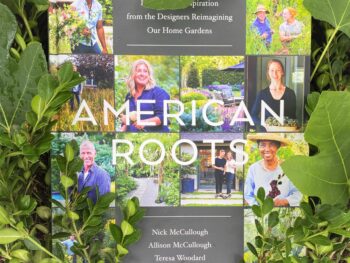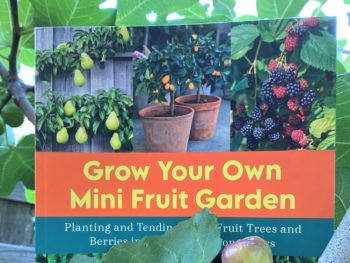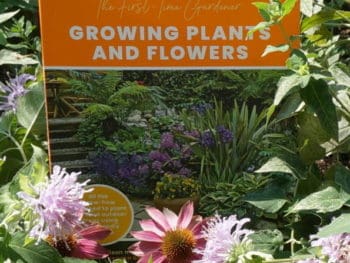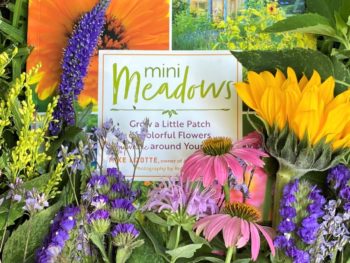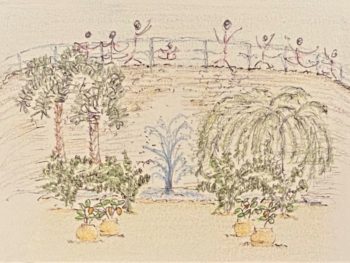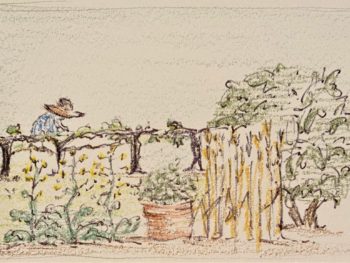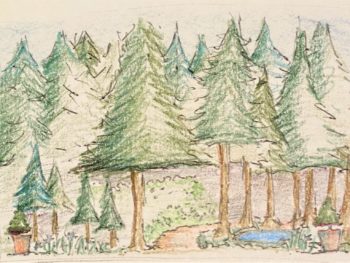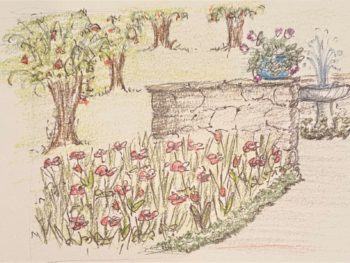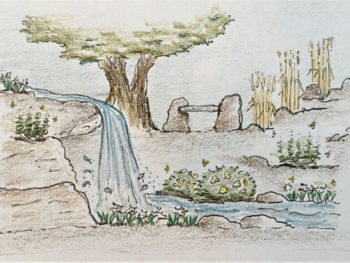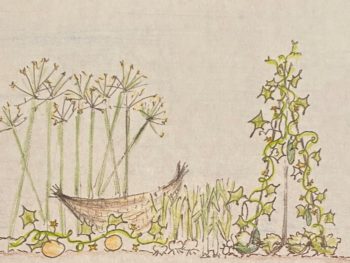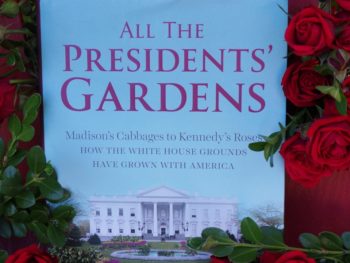Our series study on Prophets & Leaders Bible Garden Design might otherwise take a turn for the unsettling in exploring the book of Ezekiel. Ezekiel’s experience circled back to the brief mention of cherubim and flashing swords first sighted at Eden’s edge, expanding to over 40 chapters of epic, clairvoyant drama with the winged creatures zipping about on twinkling topaz wheels, what??? His predictions were far less palatable that the repentant warnings amidst Isaiah’s Evergreens; only bearable, I think, by intermittent promises of restoration given in a landscape language. In the depths of his obedient rants, Ezekiel offered home garden hopes of grain crops and fruits trees flourishing after desolation.
click here to return to the series’ first Bible Garden Design – Moses’ Murmuring Vegetables
However, embedded in the narrative is a pressing irony: “daily bread,” a descriptor established later by Jesus’ simple prayer, which has become even a secular metaphor for no-frills but soulfully-satisfying, incremental sustenance and understanding. Ezekiel was commanded to stay put for a multitude of days and eat multi-grained bread. Linger in the pairing that his staggering, other-worldly visions began with an earthy diet of basic field crops. Few landscape scenes are as grounding as a sweeping stare over “amber waves of grain.” Praise the Lord’s poetic genius and grace, establishing some common ground before leading us into inscrutable, sentencing, prophetic territory.
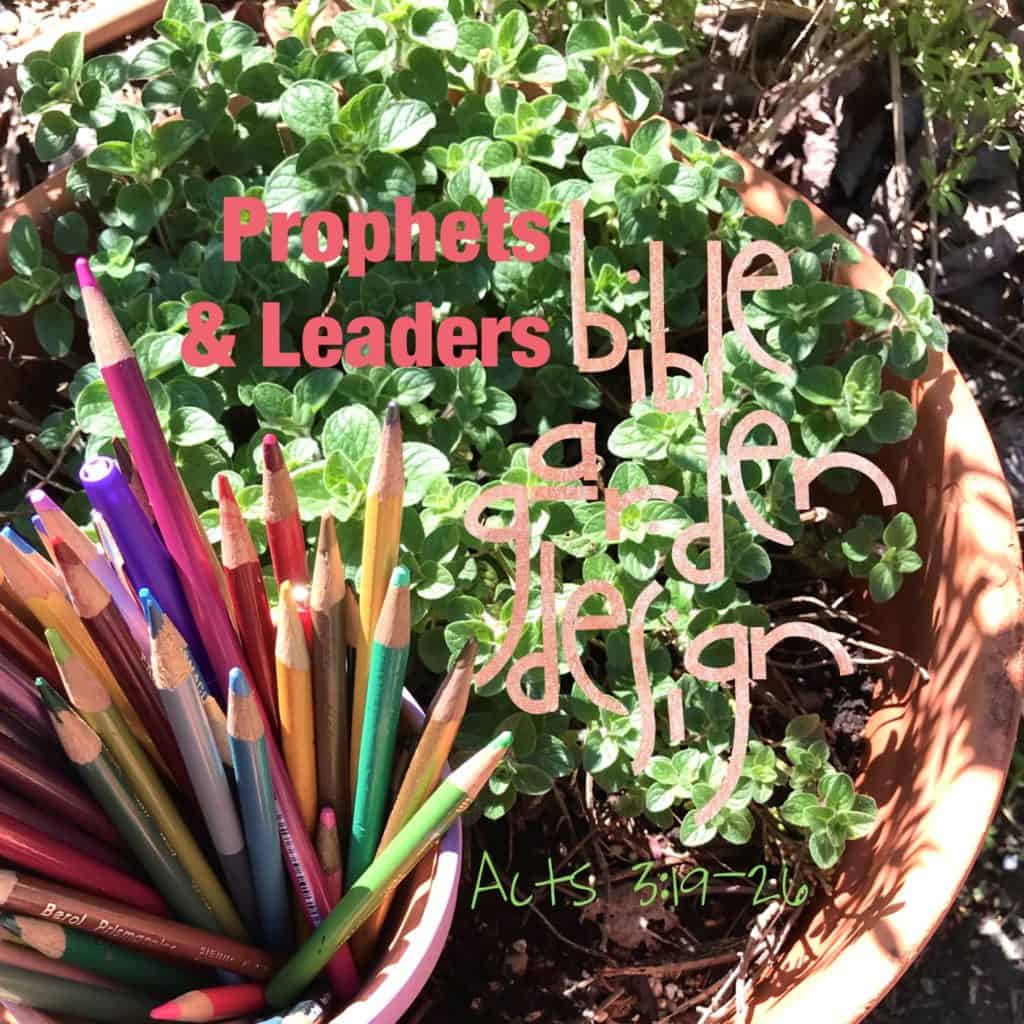
For your design of Ezekiel’s Ancient Grains, find a breezy glance and a deeper gaze, and take in whichever fits your timing:
Schematic Design will highlight key elements, complimented with a Deeper Dig into the background story if you have time for more reading.
Plant Palate will recommend plants to feature, with a Scripture Guide at the end if you would like to see the plants as they are written in verse.
Landscape Views will offer glimpses of gardens and landscapes as possible examples
Words for Lent will offer further insight for the Lenten season into the relationship of the featured prophet or leader with repentance, his Reflections of the Messiah, and the Time of Restoration spoken of by the holy prophets, guided by Acts 3:19-26.
Ezekiel’s Ancient Grains
Let the famed list of grains and legumes form the identity of this garden space, “…wheat and barley, beans and lentils, millet and spelt…” named in Ezekiel 4:9. Exiled from his Israeli homeland, Ezekiel lived in the Fertile Crescent region encircling Babylon, a land credited with the original cultivation of agricultural crops thousands of years before him, forever shifting the sustenance of civilization. Quite a backdrop for such a moment.
Brie Arthur’s Gardening with Grains
Good news! We have an excellent, new resource to glean for tending and keeping ancient grains. Horticulturist Brie Arthur has gone before us, with practiced methods in how to grow agricultural crops at home, in more intimate garden spaces. Gardening with Grains is a thorough, lively reading adventure, a how-to for incorporating pockets of standing grain in our everyday landscapes. Arthur brings us to her home and heart, sharing information, successful gardening advice, best-adapted varieties along with much needed coaching on processing methods. She ends the book with garden-to-table recipes and ways to bring the harvest into home decorating and family diets.
Through her eyes, we see that gardening with grains is truly a “pleasing to the eye and good for food” endeavor. Arthur imparts delightful urgency, eerily relevant in today’s economic upheaval. She offers all of the fun and none of the foreboding of Ezekiel…thank you, Lord, for this precious shepherd who has prepared the way.
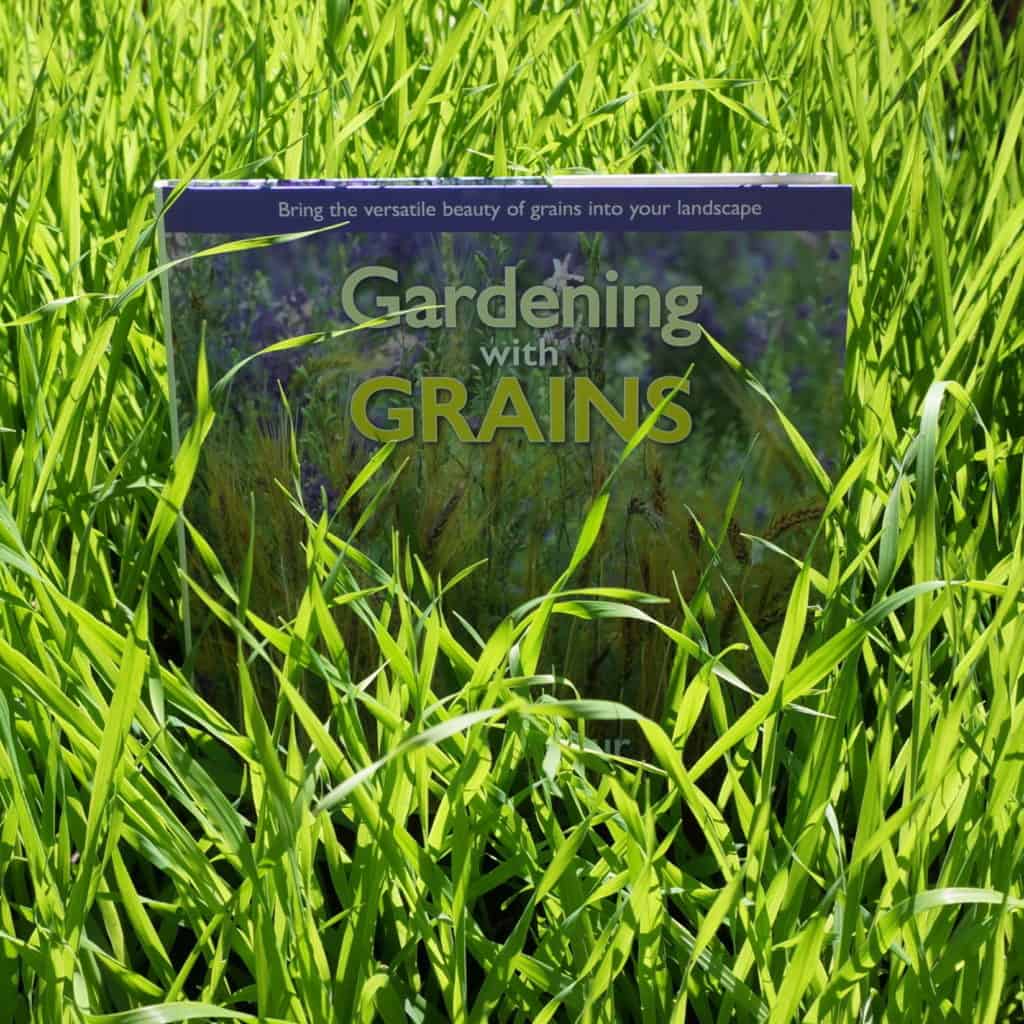
Schematic Design Ideas
Let creativity abound in planning and designing with the ancient grains and legumes of Ezekiel 4:9, all annuals grown from sowing seeds in place or transplanting sprouts. Perhaps trade the usual square-mile sections organizing our nation’s agriculture for Square Foot Gardening™ displays, planting patchworks of mini-monocultures.
Alternately, the usual combine-ordered straight rows can become meandering swaths, or punctuating pockets of Poacaea species tucked among established garden plants. The elements essential to agricultural arrangement are irrelevant in horticulture: As Arthur details, gathering grainheads will be done by hand, while field crops must be laid out with harvest machinery in mind.
“…I have come to love the harvesting aspect of my cool season grain crops because it has provided me a unique opportunity to share the experience with others…we move across the planted area and snap the seed head off, leaving the stalk. This approach makes it very fast and clean – no soil flying in the air to contaminate the harvest. Remember, those roots should be left in the ground to rot in place to improve your soil. ”
—Brie Arthur, Gardening with Grains, page 149 & 153
It will be nearly impossible to convey the sense of doom and despair that accompanied the prophet’s ominous warnings in this garden space, because the featured grains require full sun, casting out the possibility of dark, foreboding or shadowy surrounds. This in itself is a testimony to the embodiment of God’s grace in the garden and His prevailing light, hallelujah!
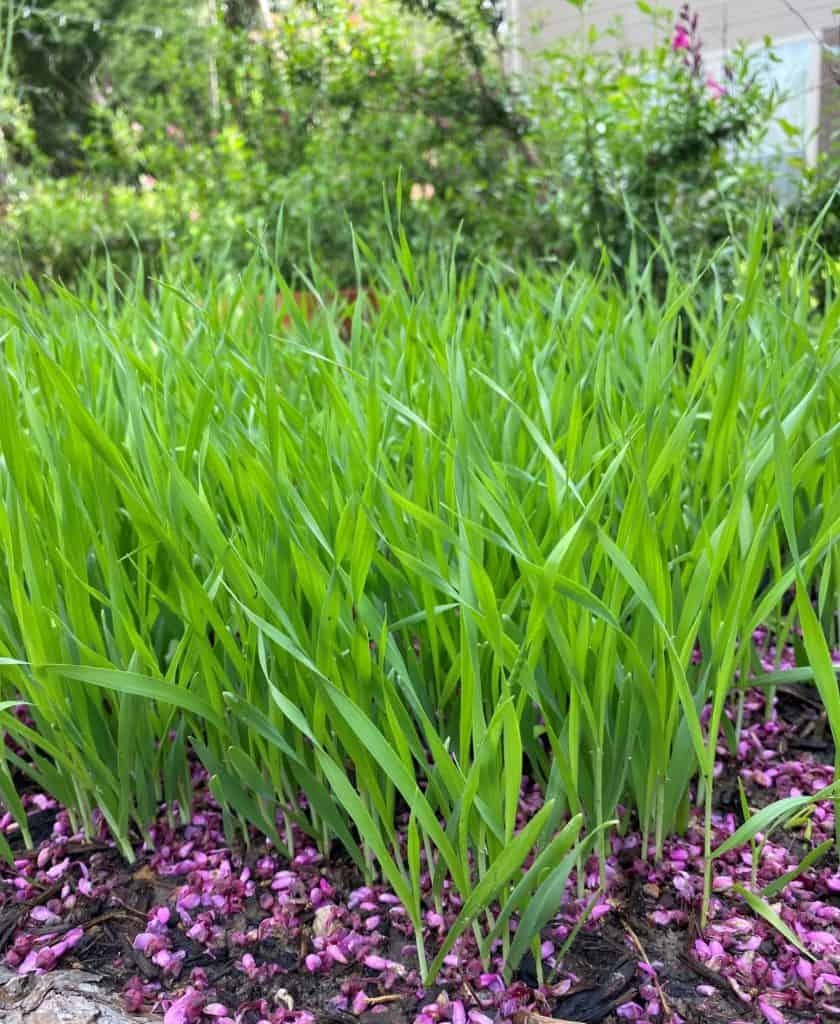
Though wheat and barley are typically imagined in their dry state, in hues of tawny browns and sun-bleached tans, sprouted seeds are emerald and verdant. Most of the days of the monocots’ life display glorious shades of green. Furthermore, many newer cultivars offer a range of colors, like ‘Utrecht Blue’ wheat and ‘Purple Majesty’ millet. Use playful color to reflect the rainbow radiance of the Lord in Ezekiel 1:28.
“I bask in the beauty. I love how grass-like plants create a dynamic landscape with kinetic appeal – another important aspect of the role grains play when used as garden accents. Like most people, I am attracted to these plants. I adore their structure, color, texture; watching them blow in the breeze…I can’t escape the draw of the aesthetic.”
—Brie Arthur, Gardening with Grains, page 30
Likewise, another theme of Ezekiel’s revelation was the burning, brilliant light surrounding fiery spiritual beings, and several of the spoken purifying purges involve fire, see Ezekiel 15:6-8. Interpretive torch lighting or a fire pit area might symbolize Ezekiel’s burning urgency to see God’s people return to the Lord.
Cherubim played a vivid role in the prophet’s experience, beginning in Ezekiel 1. These sentries were last seen in action at the garden of Eden, in the meantime watching over the ark of the covenant in forged golden representation from Tabernacle to Temple. Perhaps symbolize these beings in statuary, implying the guardianship of sacred garden sanctuaries.
Plant Palate
links provided will take you to cultural information in the Plant Guide
Grains: wheat, barley, spelt, millet
Legumes: beans, lentils
Shrubs: briers, thornbushes
Vines: grapevines
Conifers: cedar of Lebanon, juniper, cypress
Fruit Trees: noted in general without specific names, click here for some edible trees
Landscape Views
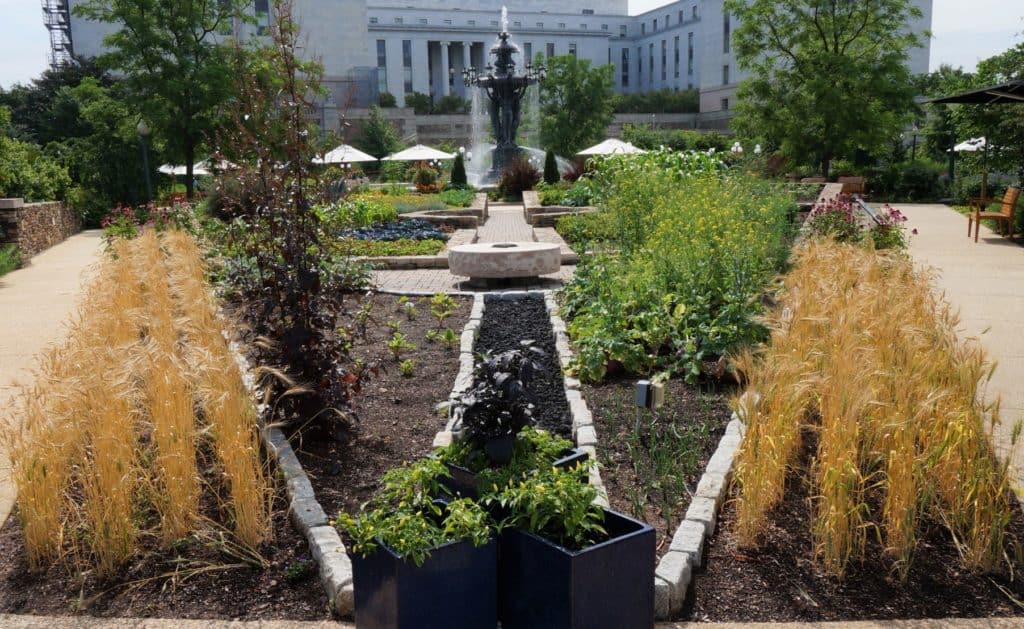
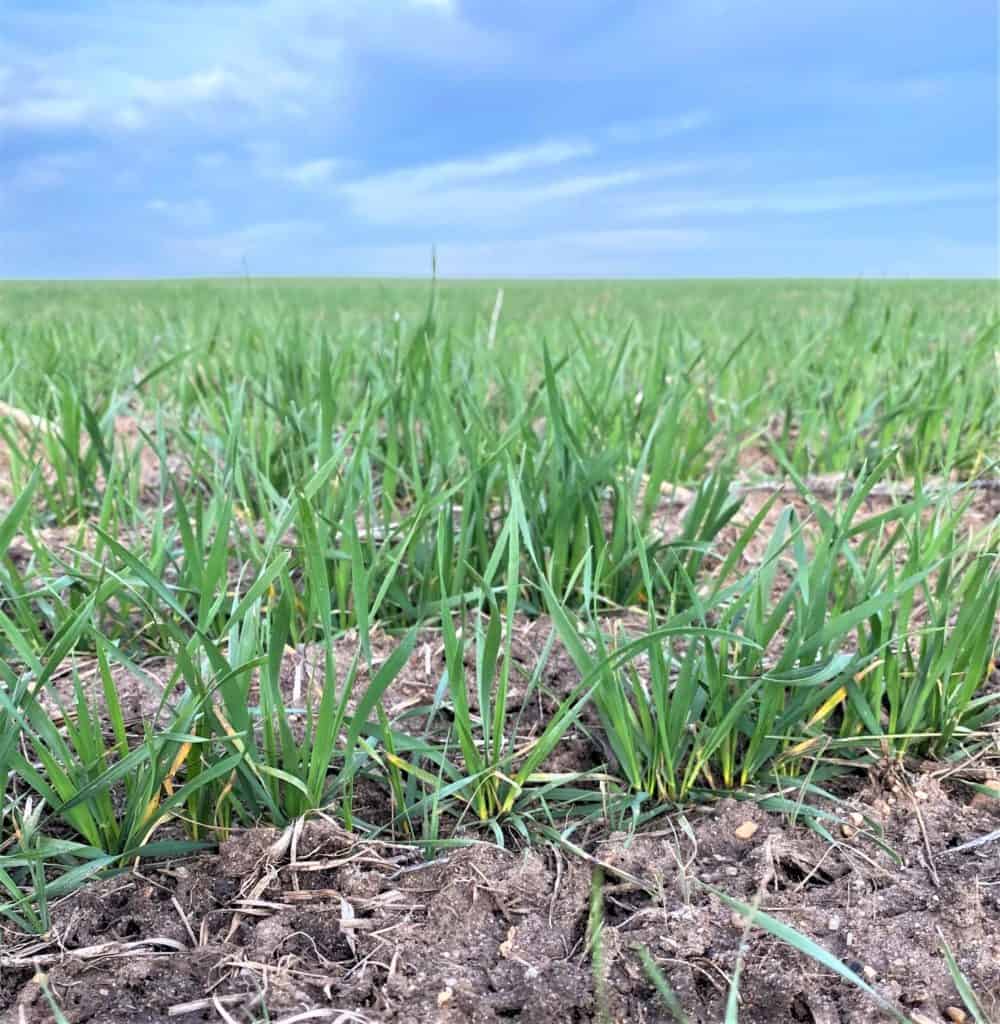
Deeper Dig into Ezekiel’s Life
Exiled to Babylon with fellow Israelites, Ezekiel was called up from the priesthood into the hand of the Lord. We do not learn of his trials and troubles endured in exiting his homeland to foreign occupation; only that in his displaced home, when the time came, he was swiftly surrounded in fiery storm and immersed in other-worldly sights, face-to-face with foreign creatures of another kind.
His epic visions served him well as appointed watchman over the exiles, fueling his relentlessness to tell the revealed truth and trembling reality of their fate if they persisted in their wicked ways. Most of his words were directed toward this cause.
Weeding through the woes, however, ushers us into a magnificent view that even the scared-straight Israelite audience might not have fully grasped. Hindsight is 20/20 as they say, and we know by flipping to the end of our Bibles that what Ezekiel saw were similar visions to John’s: revelations of Eden.
Ezekiel’s work to warn his people began at ground level, on his side, eating rudimentary “plants of the field,” after being welcomed to his urgent work by cherubim, flashing lightning strikes, and glowing metal. Note Babylon was to the east of hometown Jerusalem. Are we reading Ezekiel 1-4 or Genesis 3:18, 23, 24???
While our design ideas focus on the well-known ancient grains list and the gift we have in Brie Arthur’s work to revive these grains as garden plants, truly there are many Eden-related literary references to dig up in all that Ezekiel relayed.
Especially at book’s end, when Ezekiel saw a river flowing out of the temple planted with fruit trees on either side, whose never-ending fruitfulness and perpetually fresh leaves would provide healing, just as John would later recount—compare Ezekiel 47:12 with Revelation 22:2…and of course, with Genesis 2:9-10.
Read over the gathered Scriptures with a little more time on your hands this week, for our Lord Jesus drew on many of them in his own instruction which we will see next week
Click here to read the full book of Ezekiel
Scripture Guide
a quick reference of verses mentioning plant material and garden imagery:
…therefore the Lord God sent him out of the garden of Eden to till the ground from which he was taken. So He drove out the man; and He placed cherubim at the east of the garden of Eden, and a flaming sword which turned every way, to guard the way to the tree of life.
Genesis 3:23-24 NKJV
And you, son of man, do not be afraid of them or their words. Do not be afraid, though briers and thorns are all around you and you live among scorpions. Do not be afraid of what they say or be terrified by them, though they are a rebellious people.
Ezekiel 2:6 NIV
“Take wheat and barley, beans and lentils, millet and spelt; put them in a storage jar and use them to make bread for yourself. You are to eat it during the 390 days you lie on your side. Weigh out twenty shekels of food to eat each day and eat it at set times. Also measure out a sixth of a hin of water and drink it at set times. Eat the food as you would a loaf of barley bread…”
Ezekiel 4:9-12 NIV
And the cherubim lifted their wings and mounted up from the earth in my sight. When they went out, the wheels were beside them; and they stood at the door of the east gate of the Lord’s house, and the glory of the God of Israel was above them. This is the living creature I saw under the God of Israel by the River Chebar, and I knew they were cherubim.
Ezekiel 10:19-20 NKJV
“Say to the people of the land: ‘This is what the Sovereign Lord says about those living in Jerusalem and in the land of Israel: They will eat their food in anxiety and drink their water in despair, for their land will be stripped of everything in it because of the violence of all who live there. The inhabited towns will be laid waste and the land will be desolate. Then you will know that I am the Lord.’”
Ezekiel 12:19-20 NIV
Therefore, this is what the Lord says. Like the wood of the grapevine from among the trees of the forest, which I have fed into the fire for fuel, in the same way I will feed the inhabitants of Jerusalem into the fire. I will set my face against them. They have come out from the fire, but the fire will still devour them. Then you will know that I am the Lord when I set my face against them. I will make the land desolate because they added one infidelity to another, declares the Lord God.
Ezekiel 15:6-8 EHV
This is what the Lord God says. I myself will take part of the tip of the cedar and plant it. From the topmost of its shoots I will pluck off a tender sprig, and I myself will plant it on a high and lofty mountain. On the high mountain of Israel I will plant it. It will produce branches, bear fruit, and become a magnificent cedar. Flying birds of every kind will live under it. In the shelter of its branches they will nest. Then all the trees in the countryside will know that I, the Lord, bring down the high tree and raise up the low tree, that I make the green tree dry up, and I make the dried-up tree blossom. I, the Lord, have spoken, and I will carry it out.
Ezekiel 17:22-24 EHV
“‘Your mother was like a strong grapevine planted by the water. It was fruitful and luxuriant because of the abundant water. It had strong branches to be used as scepters by rulers… It has been transplanted to the desert, to a dry, thirsty land. Fire has gone out from its own branches, burning up its fruit, so that now it has no strong branch to be a ruler’s scepter.’”
Ezekiel 19:10-11, 13-14 CJB
Son of man, look toward the Negev, the southern part of Judah. Speak against the Negev Forest.[a] Say to the Negev Forest, ‘Listen to the word of the Lord. This is what the Lord God said: Look, I am ready to start a fire in your forest. The fire will destroy every green tree and every dry tree. The flame that burns will not be put out. All the land from south to north will be burned by the fire. Then all people will see that I, the Lord, have started the fire. The fire will not be put out!’” Then I said, “Oh, Lord God! If I say this, the people will say that I am only telling them stories.”
Ezekiel 20:46-49 ERV
a. Negev Forest: God is probably making fun of the people. The Negev is a desert area. There are no forests in the Negev
The house of Israel will never again suffer from painful briers and sharp thorn bushes that surround them on every side, and they will learn that I am the Lord.
Ezekiel 28:24 ISV
“’…They will live there securely, build houses, and plant vineyards. They will live securely when I execute judgments against all their neighbors who treat them with contempt. Then they will know that I am the Lord their God.’”
Ezekiel 28:26 CSB
Consider Assyria, once a cedar in Lebanon, with beautiful branches overshadowing the forest… All the birds of the sky nested in its boughs, all the animals of the wild gave birth under its branches; all the great nations lived in its shade. It was majestic in beauty, with its spreading boughs, for its roots went down to abundant waters. The cedars in the garden of God could not rival it, nor could the junipers equal its boughs, nor could the plane trees compare with its branches—no tree in the garden of God could match its beauty. I made it beautiful with abundant branches, the envy of all the trees of Eden in the garden of God.
Ezekiel 31:3, 6-9 NIV
Then all the trees of Eden, the choicest and best of Lebanon, the well-watered trees, were consoled in the earth below. They too, like the great cedar, had gone down to the realm of the dead, to those killed by the sword, along with the armed men who lived in its shade among the nations.
Ezekiel 31:16-17 NIV
I’ll make them and everything around my hill a blessing. I’ll send down plenty of rain in season—showers of blessing! The trees in the orchards will bear fruit, the ground will produce, they’ll feel content and safe on their land, and they’ll realize that I am God when I break them out of their slavery and rescue them from their slave masters.
Ezekiel 34:26-27 The Message
But you, O mountains of Israel, shall shoot out your branches, and yield your fruit to my people Israel; for they shall soon come home…”
Ezekiel 36:8 NRSV
…and you will be my people, and I will be your God. So I will save you from all your uncleanness. I will command the grain to come and grow; I will not allow a time of hunger to hurt you. I will increase the harvest of the field so you will never again suffer shame among the nations because of hunger.
Ezekiel 36:28-30 NCV
The man brought me back to the entrance to the temple, and I saw water coming out from under the threshold of the temple toward the east (for the temple faced east)… but now it was a river that I could not cross, because the water had risen and was deep enough to swim in—a river that no one could cross. He asked me, “Son of man, do you see this?” Then he led me back to the bank of the river. When I arrived there, I saw a great number of trees on each side of the river. He said to me, “….Fruit trees of all kinds will grow on both banks of the river. Their leaves will not wither, nor will their fruit fail. Every month they will bear fruit, because the water from the sanctuary flows to them. Their fruit will serve for food and their leaves for healing.”
Ezekiel 47:1, 5-8, 12 NIV
Words for Lent
So you must change your hearts and lives. Come back to God, and he will forgive your sins…Acts 3:19 ERV
Ezekiel could not have been more emphatic on this point, to come back to God:
This is what the Lord God said. “So come back to me! Stop committing those crimes and do away with those things that cause you to sin! Throw away all the terrible idols with which you committed your crimes! Change your heart and spirit. People of Israel, why should you do things that will cost you your life? I don’t want to kill you! Please come back and live!” This is what the Lord God said.
Ezekiel 18:30-32 ERV
Ezekiel’s Reflections of the Messiah
Then the Lord will give you times of spiritual rest. He will send you Jesus, the one he chose to be the Messiah. Acts 3:20 ERV
Ezekiel saw the time when the kingship of David’s descendants would come to One who would be equally a righteous leader and a mindful shepherd, establishing ultimate peace:
“‘And my servant David will be the king over them. There will be only one shepherd over all of them. They will live by my rules and obey my laws. They will do the things I tell them…My servant David will be their leader forever. And I will make a peace agreement with them. This agreement will continue forever…’”
Ezekiel 37:24, 25-26 ERV
Ezekiel’s Reflections of the Time of Restoration
… But Jesus must stay in heaven until the time when all things will be made right again. God told about this time when he spoke long ago through his holy prophets. Acts 3:21 ERV
Ezekiel offered many pictures of the coming restoration, and certainly the most epic are the over-the-top descriptions of the temple revitalized once more, filled with the radiance of the glory of the Lord. However, my favorite Word regarding the time when things will be made right again is a simple, intimate phrase, showing God’s heart-felt joy and preparation for his people to come home:
“‘But you, mountains of Israel, will produce branches and fruit for my people Israel, for they will soon come home…”
Ezekiel 36:8 NIV
Prayer: O Lord, how breathtaking to hear your make-ready Words for your people who are coming home—we are all home right now! Help me weed through the woes, embrace the simplicity of living day-by-day, all the while keeping an eye out for the epic works and surprising revelations at hand. O Lord, please take me in your hand!
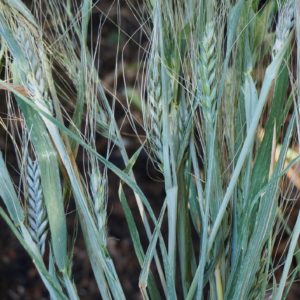
Further Study
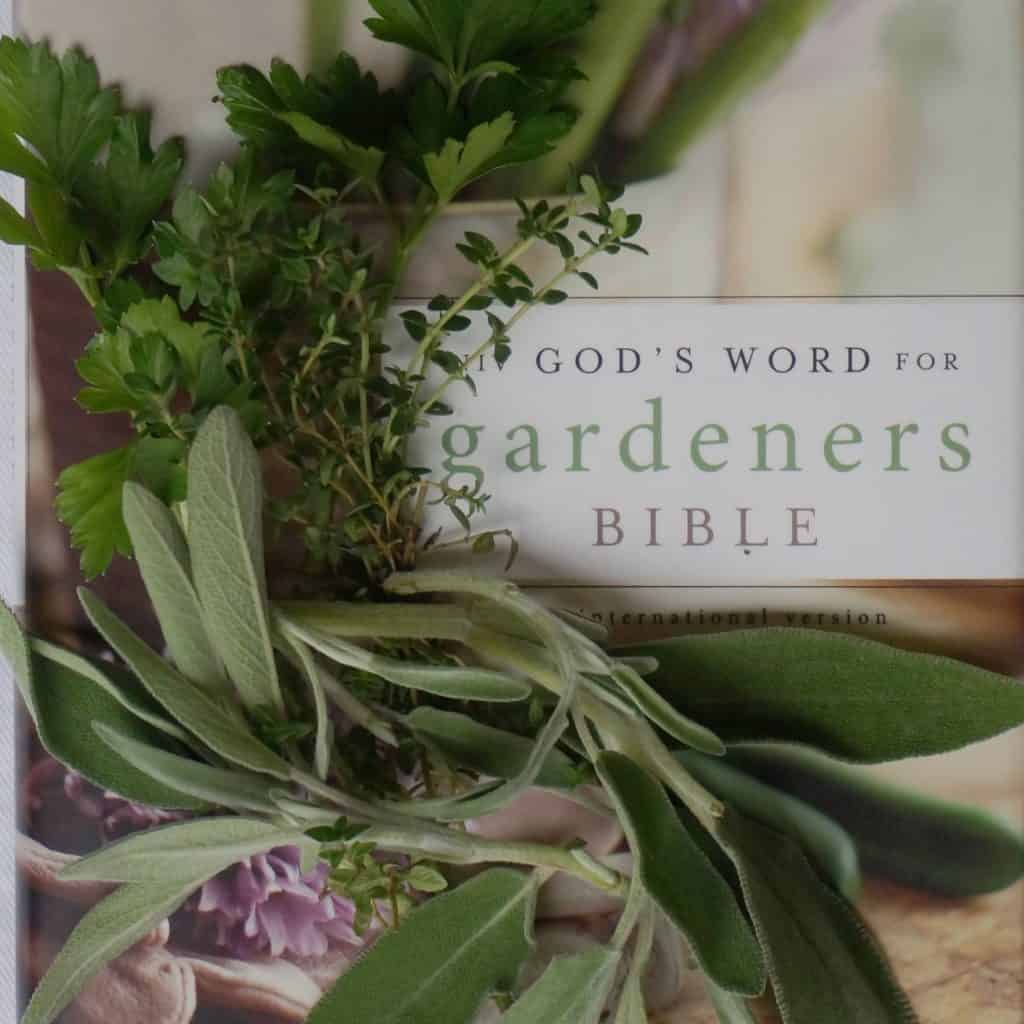
Dig into more devotions in the Garden Work section of God’s Word for Gardeners Bible on Sowing and Reaping, featuring a study of barley, beginning on page a-31; and on Rooting, featuring a study on lentils, beginning on page a-32. Wheat is part of the devotions on Celebrating the Harvest, page a-36.
A bushel of thanks to author Brie Arthur, www.briegrows.com, and the editors at St. Lynn’s Press, publishers of Gardening with Grains (Pittsburgh: St. Lynn’s Press, 2019). They supplied me with a complimentary copy of the book for this review.
See the Plant Index for a complete list of all the mentions of plants in God’s Word for Gardeners Bible, www.gardenindelight.com/plant-index-gods-word-for-gardeners/
Find a Biblical plant bibliography in Plant Resources, www.gardenindelight.com/plant-resources/
Photo Credits & sketches
©2019-20 Shelley S. Cramm

